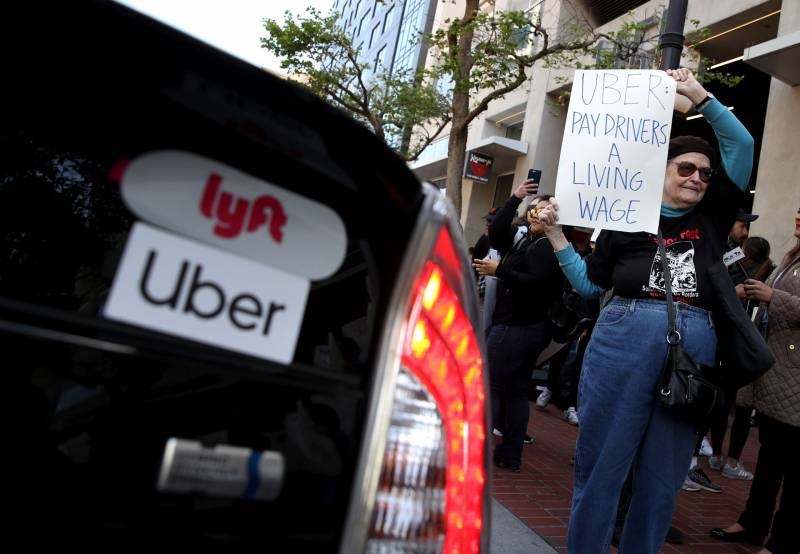“Voters knew what they were voting on,” said Jennifer Barrera, president of the California Chamber of Commerce. “They wanted to maintain the flexibility for these gig workers and provide them the opportunity to do this work. And I think that’s ultimately what the judge did — is to uphold that flexibility.”
But while this chapter has drawn to a close, the story probably isn’t over. The Service Employees International Union is challenging the constitutionality of the measure and may appeal the ruling.
“Drivers have always led this movement, and we will follow their lead as we consider all options — including seeking review from the [California] Supreme Court — to ensure that gig drivers and delivery workers have access to the same rights and protections afforded to other workers in California,” Tia Orr, executive director of SEIU California, said in a statement.
Lorena Gonzalez Fletcher, executive secretary-treasurer of the California Labor Federation, an umbrella organization for labor unions, which opposed Prop. 22, lambasted the ruling.
“Today the Appeals Court chose to stand with powerful corporations over working people, allowing companies to buy their way out of our state’s labor laws and undermine our state constitution,” she said in a statement. “Our system is broken. It would be an understatement to say we are disappointed by this decision.”
In an interview earlier this month, UC Berkeley Law professor Catherine Fisk said she’d be “stunned” if whichever side lost didn’t appeal the decision.
“There’s just too much money at stake — for both sides,” she said.
The judicial system moves slowly, so it could be months before the California Supreme Court decides on whether or not to hear an appeal.
The case has ramifications beyond this initiative, said Kurt Oneto, an attorney with Nielsen Merksamer, the firm representing the coalition of gig companies, and is defending the ballot measure in court.
The challenges to the initiative “would drastically undercut and restrain the initiative power of California voters,” he told CalMatters earlier this year.
But ultimately at stake are the kinds of pay, benefits and legal protections that drivers are entitled to, said Stacey Leyton, attorney with Altshuler Berzon, the law firm representing SEIU and workers in challenging the ballot measure.
But the effects will extend beyond drivers, she said.
“When companies exploit their workers and misclassify their workers, it has the effect of harming all workers,” said Leyton.
How did we get here?
California’s battle over the classification of workers began in 2018, when the state Supreme Court issued a ruling that established a new standard for who can be counted as an independent contractor. That decision spurred a new state law that classified workers in many sectors — including truckers, commercial janitors, nail salon workers, physical therapists and gig economy workers — as employees.
After failing to get the ride-share industry exempted from the new law, Uber and Lyft upped the ante, threatening to write a ballot measure to do so unless they could negotiate another deal. They argued that changing the employment status of drivers would reduce workers’ flexibility and “pose a risk to our businesses.”
In 2020, the companies forged ahead with Prop. 22, which became a pitched battle between labor and business, breaking state campaign finance records in the process.
In addition to classifying workers as independent contractors, the measure offered gig workers certain incentives, in lieu of standard employee benefits, including 120% of minimum wage for “active” driving time (but not time waiting), a partial health care subsidy for those who clocked enough hours per week, and on-the-job injury coverage.
The measure passed with 58% of the vote in November 2020.
Shortly after Prop. 22 passed, SEIU and a group of drivers mounted a legal challenge, arguing that it violated California’s constitution. Their case was eventually heard by a judge in Alameda County Superior Court, who in 2021 struck down Prop. 22 (PDF) as unconstitutional. But attorneys representing the state and the coalition representing gig companies appealed that decision, sending it to the appeals court.
What's happened since Prop. 22 went into effect
What has changed — for better or worse — since the measure took effect depends somewhat on who you ask.
Jose Pineda, a driver for DoorDash in Northridge who was referred to CalMatters by the industry coalition, says his hourly pay has increased from about $23–$25 (before costs) to $27–$30. After switching from Medi-Cal to an insurance plan through Covered California, he receives a health stipend of about $75 every two weeks, he said. He supported Prop. 22, and said, “I think it’s good. I think we need it. I mean, what else is out there?”
Contrast that with the experience of Daryush Khodadadi-Mobarakeh, who was referred to CalMatters by SEIU. Khodadadi-Mobarakeh, who drives 35 to 40 hours a week for several companies, including Uber, Lyft and DoorDash, and is a leader with the California Gig Workers Union, said his pay has consistently decreased since he began working in 2014, and particularly after Prop. 22 went into effect.
Now it takes him about 12 hours to make the same amount he used to earn in eight hours before Prop. 22, he said.
How drivers’ wages have been affected by Prop. 22 depends in part on how working hours and expenses are calculated (and who's doing the research). A study paid for by the industry coalition and conducted by researchers at UC Riverside found that in late 2021, drivers for DoorDash, Instacart, Lyft and Uber earned $34.46 in gross pay per hour of “engaged” time — the time between accepting a ride or delivery and dropping off the order or rider. That was up from $27.34 in late 2019, before the measure passed. Those wages don’t account for the time workers spend waiting between rides, or costs like fuel, car maintenance and insurance.

